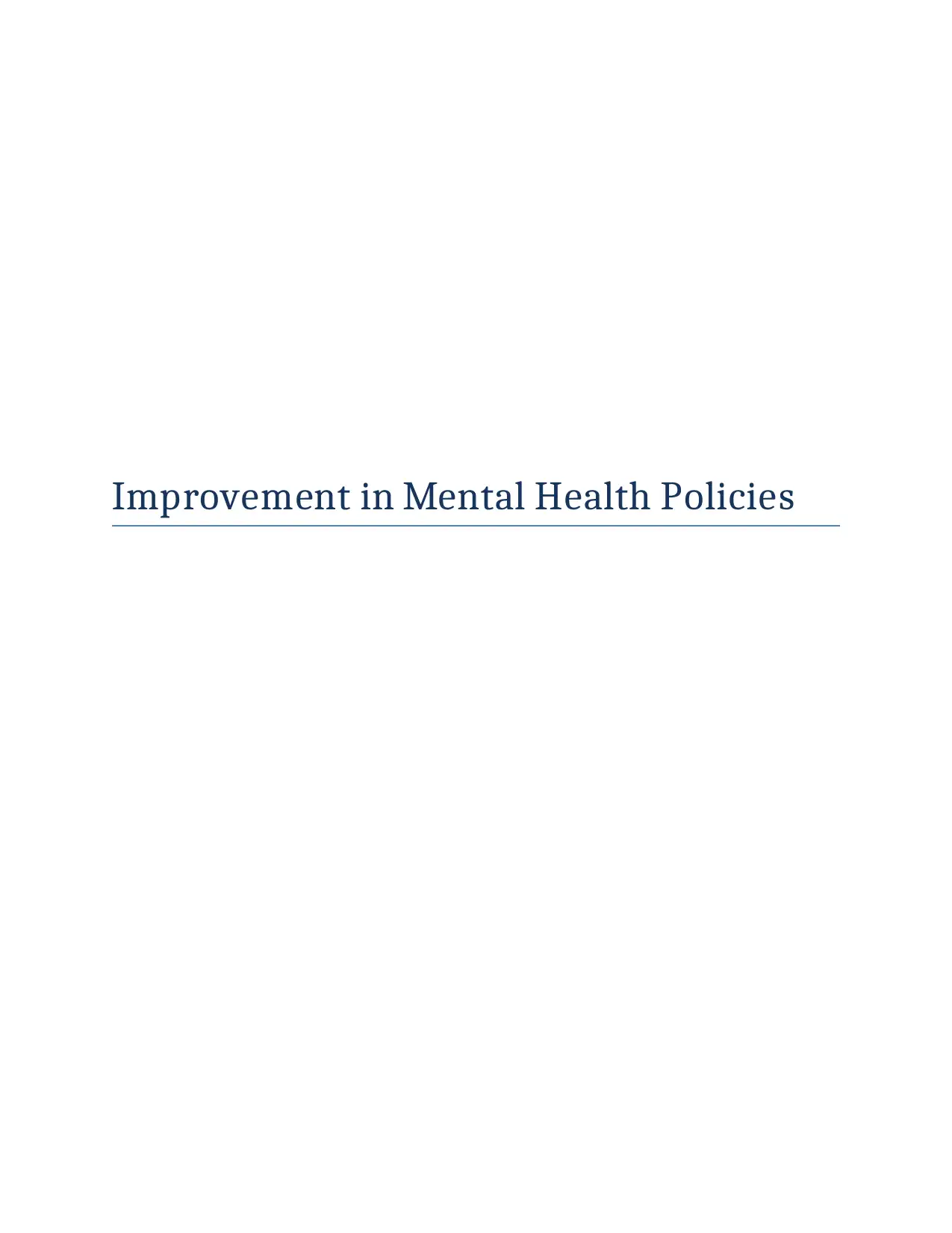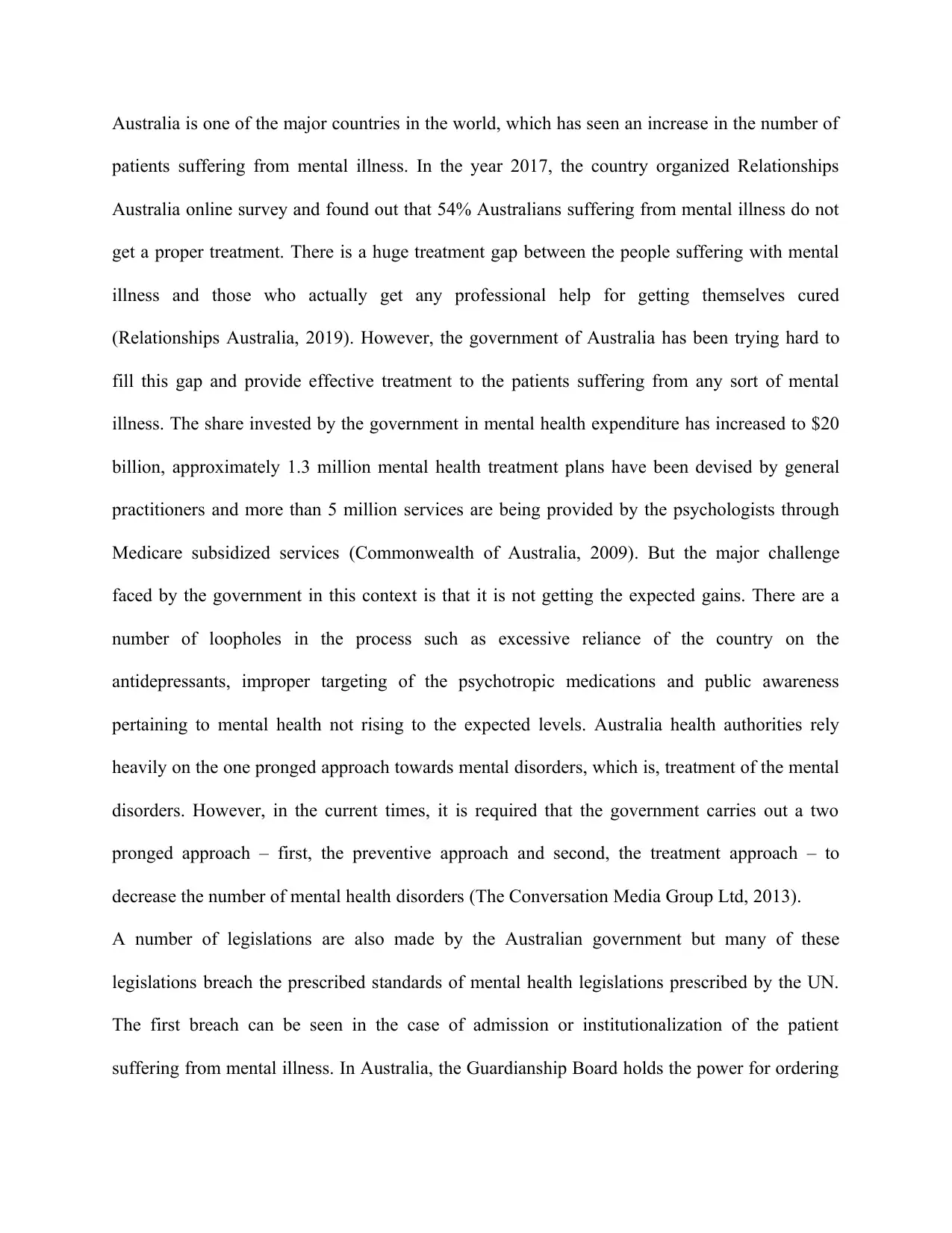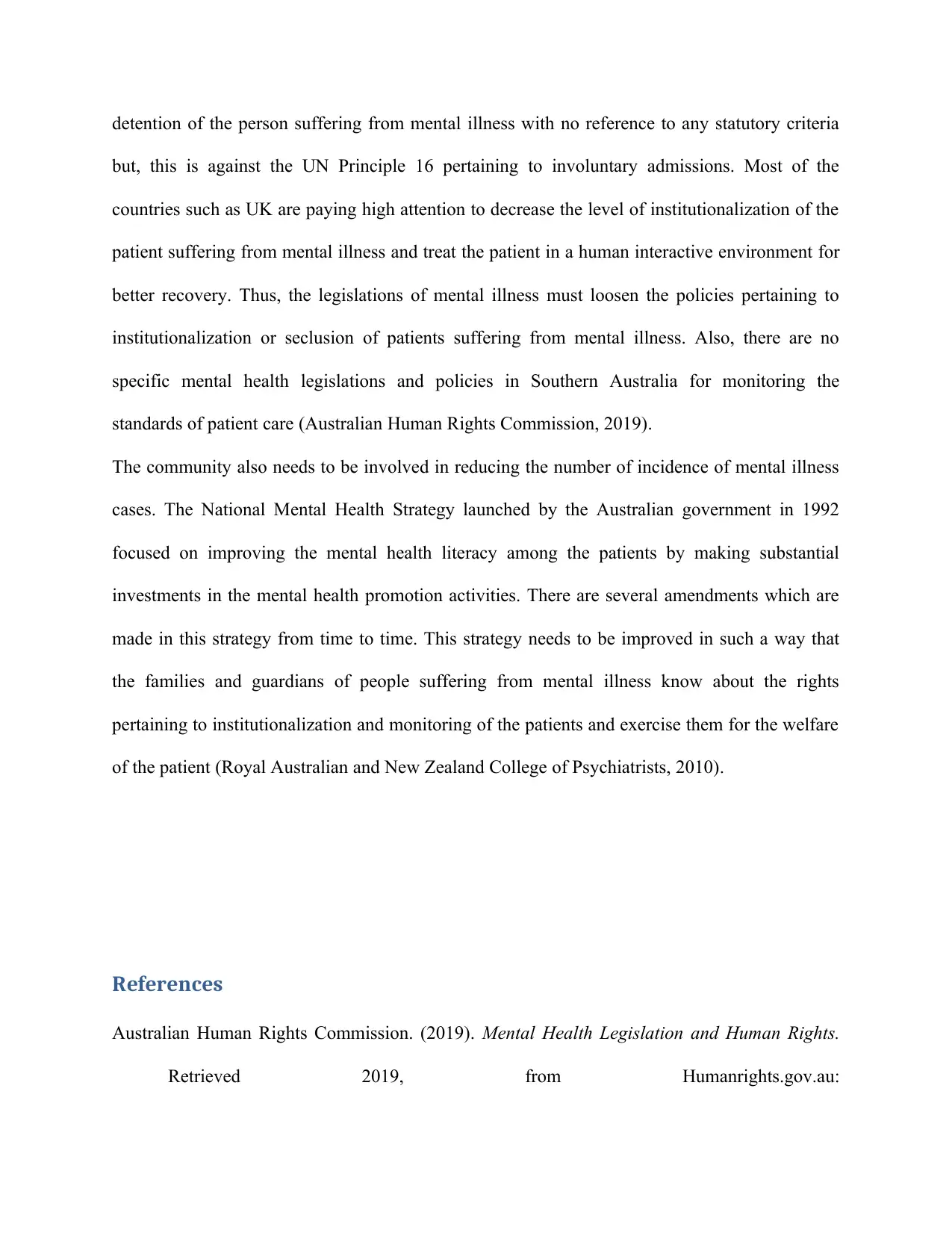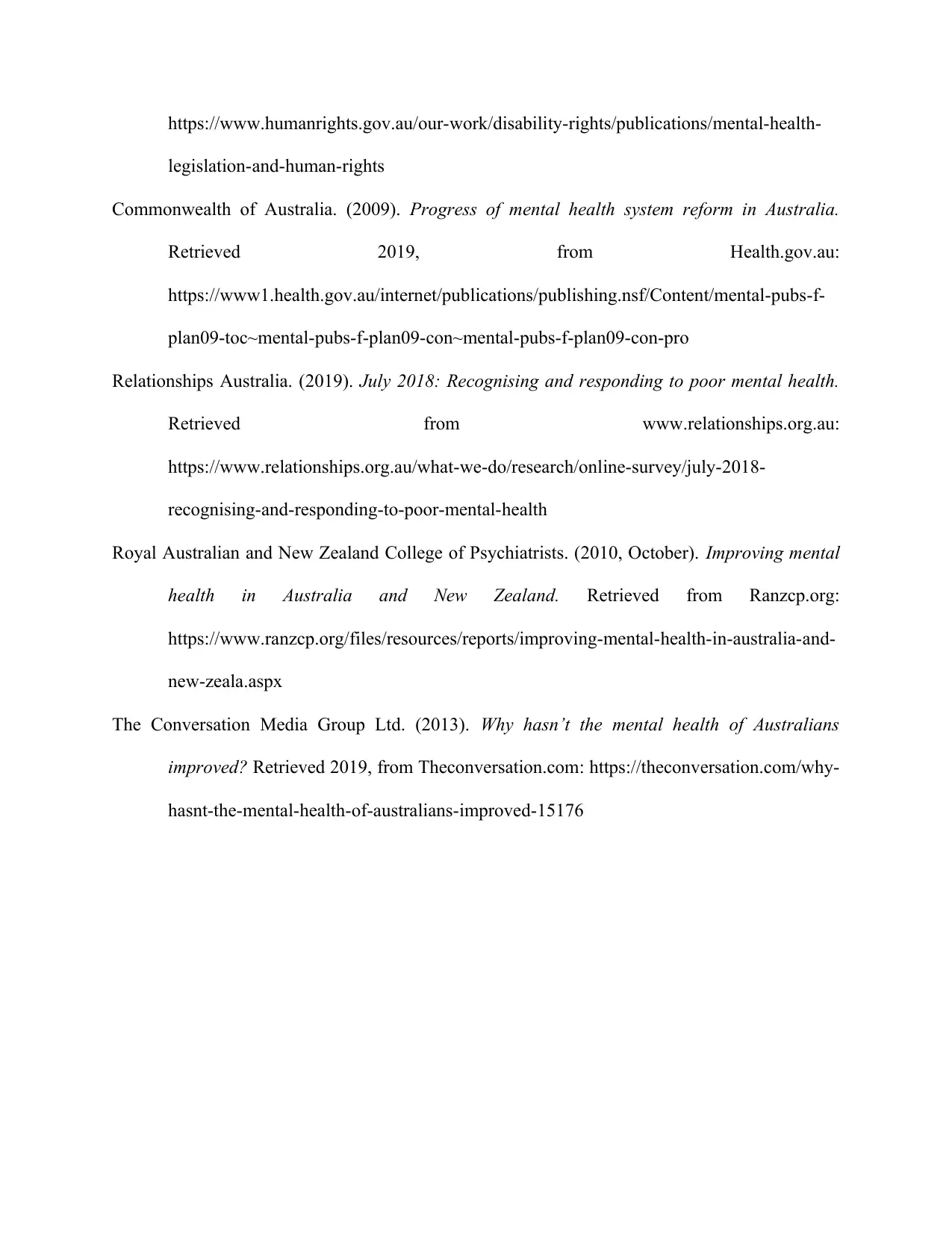Analysis of Mental Health Policy in Australia: Recommendations
VerifiedAdded on 2022/09/18
|4
|748
|44
Essay
AI Summary
This essay examines the current state of mental health policies in Australia, highlighting the significant treatment gap where a large percentage of Australians suffering from mental illness do not receive proper care, despite increased government investment. It critiques the reliance on a singular treatment approach and advocates for a two-pronged strategy including prevention. The analysis points out breaches in mental health legislations, particularly concerning involuntary admissions and lack of patient care monitoring in certain regions. The essay emphasizes the need for improved mental health literacy, the involvement of families, and the amendment of existing strategies to better protect patient rights and improve overall outcomes. The essay uses data from various sources including Relationships Australia and the Australian Human Rights Commission.

Improvement in Mental Health Policies
Paraphrase This Document
Need a fresh take? Get an instant paraphrase of this document with our AI Paraphraser

Australia is one of the major countries in the world, which has seen an increase in the number of
patients suffering from mental illness. In the year 2017, the country organized Relationships
Australia online survey and found out that 54% Australians suffering from mental illness do not
get a proper treatment. There is a huge treatment gap between the people suffering with mental
illness and those who actually get any professional help for getting themselves cured
(Relationships Australia, 2019). However, the government of Australia has been trying hard to
fill this gap and provide effective treatment to the patients suffering from any sort of mental
illness. The share invested by the government in mental health expenditure has increased to $20
billion, approximately 1.3 million mental health treatment plans have been devised by general
practitioners and more than 5 million services are being provided by the psychologists through
Medicare subsidized services (Commonwealth of Australia, 2009). But the major challenge
faced by the government in this context is that it is not getting the expected gains. There are a
number of loopholes in the process such as excessive reliance of the country on the
antidepressants, improper targeting of the psychotropic medications and public awareness
pertaining to mental health not rising to the expected levels. Australia health authorities rely
heavily on the one pronged approach towards mental disorders, which is, treatment of the mental
disorders. However, in the current times, it is required that the government carries out a two
pronged approach – first, the preventive approach and second, the treatment approach – to
decrease the number of mental health disorders (The Conversation Media Group Ltd, 2013).
A number of legislations are also made by the Australian government but many of these
legislations breach the prescribed standards of mental health legislations prescribed by the UN.
The first breach can be seen in the case of admission or institutionalization of the patient
suffering from mental illness. In Australia, the Guardianship Board holds the power for ordering
patients suffering from mental illness. In the year 2017, the country organized Relationships
Australia online survey and found out that 54% Australians suffering from mental illness do not
get a proper treatment. There is a huge treatment gap between the people suffering with mental
illness and those who actually get any professional help for getting themselves cured
(Relationships Australia, 2019). However, the government of Australia has been trying hard to
fill this gap and provide effective treatment to the patients suffering from any sort of mental
illness. The share invested by the government in mental health expenditure has increased to $20
billion, approximately 1.3 million mental health treatment plans have been devised by general
practitioners and more than 5 million services are being provided by the psychologists through
Medicare subsidized services (Commonwealth of Australia, 2009). But the major challenge
faced by the government in this context is that it is not getting the expected gains. There are a
number of loopholes in the process such as excessive reliance of the country on the
antidepressants, improper targeting of the psychotropic medications and public awareness
pertaining to mental health not rising to the expected levels. Australia health authorities rely
heavily on the one pronged approach towards mental disorders, which is, treatment of the mental
disorders. However, in the current times, it is required that the government carries out a two
pronged approach – first, the preventive approach and second, the treatment approach – to
decrease the number of mental health disorders (The Conversation Media Group Ltd, 2013).
A number of legislations are also made by the Australian government but many of these
legislations breach the prescribed standards of mental health legislations prescribed by the UN.
The first breach can be seen in the case of admission or institutionalization of the patient
suffering from mental illness. In Australia, the Guardianship Board holds the power for ordering

detention of the person suffering from mental illness with no reference to any statutory criteria
but, this is against the UN Principle 16 pertaining to involuntary admissions. Most of the
countries such as UK are paying high attention to decrease the level of institutionalization of the
patient suffering from mental illness and treat the patient in a human interactive environment for
better recovery. Thus, the legislations of mental illness must loosen the policies pertaining to
institutionalization or seclusion of patients suffering from mental illness. Also, there are no
specific mental health legislations and policies in Southern Australia for monitoring the
standards of patient care (Australian Human Rights Commission, 2019).
The community also needs to be involved in reducing the number of incidence of mental illness
cases. The National Mental Health Strategy launched by the Australian government in 1992
focused on improving the mental health literacy among the patients by making substantial
investments in the mental health promotion activities. There are several amendments which are
made in this strategy from time to time. This strategy needs to be improved in such a way that
the families and guardians of people suffering from mental illness know about the rights
pertaining to institutionalization and monitoring of the patients and exercise them for the welfare
of the patient (Royal Australian and New Zealand College of Psychiatrists, 2010).
References
Australian Human Rights Commission. (2019). Mental Health Legislation and Human Rights.
Retrieved 2019, from Humanrights.gov.au:
but, this is against the UN Principle 16 pertaining to involuntary admissions. Most of the
countries such as UK are paying high attention to decrease the level of institutionalization of the
patient suffering from mental illness and treat the patient in a human interactive environment for
better recovery. Thus, the legislations of mental illness must loosen the policies pertaining to
institutionalization or seclusion of patients suffering from mental illness. Also, there are no
specific mental health legislations and policies in Southern Australia for monitoring the
standards of patient care (Australian Human Rights Commission, 2019).
The community also needs to be involved in reducing the number of incidence of mental illness
cases. The National Mental Health Strategy launched by the Australian government in 1992
focused on improving the mental health literacy among the patients by making substantial
investments in the mental health promotion activities. There are several amendments which are
made in this strategy from time to time. This strategy needs to be improved in such a way that
the families and guardians of people suffering from mental illness know about the rights
pertaining to institutionalization and monitoring of the patients and exercise them for the welfare
of the patient (Royal Australian and New Zealand College of Psychiatrists, 2010).
References
Australian Human Rights Commission. (2019). Mental Health Legislation and Human Rights.
Retrieved 2019, from Humanrights.gov.au:
⊘ This is a preview!⊘
Do you want full access?
Subscribe today to unlock all pages.

Trusted by 1+ million students worldwide

https://www.humanrights.gov.au/our-work/disability-rights/publications/mental-health-
legislation-and-human-rights
Commonwealth of Australia. (2009). Progress of mental health system reform in Australia.
Retrieved 2019, from Health.gov.au:
https://www1.health.gov.au/internet/publications/publishing.nsf/Content/mental-pubs-f-
plan09-toc~mental-pubs-f-plan09-con~mental-pubs-f-plan09-con-pro
Relationships Australia. (2019). July 2018: Recognising and responding to poor mental health.
Retrieved from www.relationships.org.au:
https://www.relationships.org.au/what-we-do/research/online-survey/july-2018-
recognising-and-responding-to-poor-mental-health
Royal Australian and New Zealand College of Psychiatrists. (2010, October). Improving mental
health in Australia and New Zealand. Retrieved from Ranzcp.org:
https://www.ranzcp.org/files/resources/reports/improving-mental-health-in-australia-and-
new-zeala.aspx
The Conversation Media Group Ltd. (2013). Why hasn’t the mental health of Australians
improved? Retrieved 2019, from Theconversation.com: https://theconversation.com/why-
hasnt-the-mental-health-of-australians-improved-15176
legislation-and-human-rights
Commonwealth of Australia. (2009). Progress of mental health system reform in Australia.
Retrieved 2019, from Health.gov.au:
https://www1.health.gov.au/internet/publications/publishing.nsf/Content/mental-pubs-f-
plan09-toc~mental-pubs-f-plan09-con~mental-pubs-f-plan09-con-pro
Relationships Australia. (2019). July 2018: Recognising and responding to poor mental health.
Retrieved from www.relationships.org.au:
https://www.relationships.org.au/what-we-do/research/online-survey/july-2018-
recognising-and-responding-to-poor-mental-health
Royal Australian and New Zealand College of Psychiatrists. (2010, October). Improving mental
health in Australia and New Zealand. Retrieved from Ranzcp.org:
https://www.ranzcp.org/files/resources/reports/improving-mental-health-in-australia-and-
new-zeala.aspx
The Conversation Media Group Ltd. (2013). Why hasn’t the mental health of Australians
improved? Retrieved 2019, from Theconversation.com: https://theconversation.com/why-
hasnt-the-mental-health-of-australians-improved-15176
1 out of 4
Related Documents
Your All-in-One AI-Powered Toolkit for Academic Success.
+13062052269
info@desklib.com
Available 24*7 on WhatsApp / Email
![[object Object]](/_next/static/media/star-bottom.7253800d.svg)
Unlock your academic potential
Copyright © 2020–2026 A2Z Services. All Rights Reserved. Developed and managed by ZUCOL.





